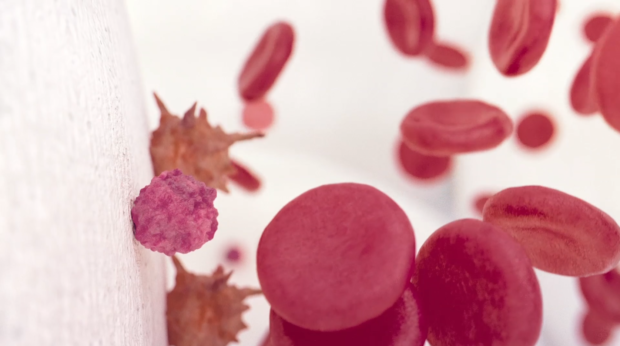Those patients suffering from active ulcerative colitis who meet the criteria of being steroid-dependent and not responding or being intolerant to biologics have very limited treatment options. That is the reason why the apparition of safer and more effective alternative therapies to treat the ulcerative colitis is an urgent need for this collective.
News
Ulcerative colitis treatment for steroid-dependent patients with previous failure to biologics: Adacolumn®
May 19, 2020
Product

Treatment for ulcerative colitis: steroids and biologic therapy
Ulcerative colitis affects between 2.5 to 3 million people in Europe and, principally, to the young population. Half of them1 need a steroid treatment to control severe or moderate outbreaks. And, up to 40%, of them relapses whilst reducing the dose or shortly after finishing the treatment. That is known as steroid- dependent patients with ulcerative colitis.
This steroid treatment is very effective to control the symptoms of an inflammatory bowel disease outbreak. It has important advantages such as, its power (more than 80% of cases respond to steroids). Besides, they are cheap, can be administered orally in most cases, and can be used as an initial treatment for IBD cases where we still need to evaluate which definitive treatment to use.
However, the steroid treatment has important disadvantages. Firstly, they are not effective as a maintenance treatment. But, apart from that, they also have quite frequent side effects (approximately 1 out of 3 patients) and, sometimes, those are severe. Moreover, in the long term, the steroids do not modify the course of the disease. Those drugs increase the risk of suffering infections too.
Those disadvantages force the professionals to look for alternative treatments for the ulcerative colitis until achieving its remission. The TNF inhibitor drugs have been a crucial step forward here. They are indicated in patients suffering from Crohn’s disease or ulcerative colitis with a moderate-severe outbreak who do not respond favorably to conventional treatments or who present intolerance and/or contraindications to steroids or immunosuppressant therapies. However they are neither risk- free. In addition, complete remission is not achieved in more than 40% of cases2.
Alternative treatments for ulcerative colitis: leukocyte apheresis
Leukocyte apheresis is a non-pharmacological treatment based on a technique that separates blood components, removing the activated leukocytes that play a role in the inflammatory process. The treatment regimen in the ulcerative colitis treatment is usually 5 to 10 weekly sessions of one hour.
Within this technique, there are two different systems:
- Centrifugation. A lymphocyte-rich fraction is removed after centrifuging a significant volume of the patient’s plasma.
- Adsorption. Blood passes through a column or filter where various leukocyte subpopulations are adsorbed. In this case, the most used device in the treatment of ulcerative colitis is the Granulocyte/Monocyte Apheresis (GMA) System with Adacolumn, whose use has been approved in the European Union since 2001.
Mode of action of Adacolumn
The medical device Adacolumn is a column formed by cellulose acetate beads bathed in saline where granulocytes (65%), monocytes (55%) and lymphocytes (2%) are selectively adsorbed. When the blood passes through it, the granulocytes, the monocytes/macrophages and the leukocytes that favor IBD adhere to the cellulose acetate spheres through the activation of the complement cascade and are removed from the bloodstream.
By reducing the amount of leukocytes in the circulatory system, non-activated young leukocytes without the ability to migrate to the inflammatory focus are mobilized from the bone marrow. In addition, an immunomodulation phenomenon occurs and, secondarily, there is also a decrease of the inflammatory infiltrate and the tissue damage3.
A Safe and effective treatment for ulcerative colitis
The treatment of ulcerative colitis in steroid-dependent patients with the GMA technique has several benefits:
- Saves steroids: the combination of steroids with apheresis favors the remission of the disease using a lower dosage and, therefore, limiting their side effects. That is the reason for it to be the best scenario to apply this technique.
- It has an excellent safety and efficacy profile.
And precisely regarding this last point, several studies have been carried out in order to verify whether those conditions are satisfied. In fact, as of 2016 there is already talk of Adacolumn proving to be an effective non-pharmacological treatment for patients with ulcerative colitis. And some studies highlight that it has proven to be extremely safe in records of clinical practice.
Studies on Adacolumn in the treatment of ulcerative colitis
Treatment with prednisone and GMA
Another research, the ATICCA1 study, aimed to evaluate the efficacy and safety of the addition of GMA to a conventional treatment for ulcerative colitis of oral prednisone in patients who meet one of the conditions we are talking about: be steroid-dependent.
Specifically, the research focused on checking the differences between a conventional oral prednisone treatment and another one in which seven GMA sessions are added, gradually reducing steroid medication over 9 weeks. The main conclusion is that the combined treatment delayed the clinical relapse and was associated with a higher rate of remission in patients who had not been treated with thiopurine.
Treatment with TNF inhibitors and GMA
Like the previous study, we found another analysis5. This time, it was developed to test the effectiveness and safety of the combination of GMA with TNF inhibitors. Likewise, the results show that it is a safe and effective treatment after the loss of response to biological agents with a significant reduction in the clinical activity of the disease and the biomarkers.
In conclusion, these data show that the quality of life of patients suffering from steroid-dependent ulcerative colitis and with previous failure to biologics improved significantly and that the intensity of most mild to moderate adverse events was reduced with Adacolumn.
BIBLIOGRAPHY
*1 Addition of Granulocyte/Monocyte Apheresis to Oral Prednisone for Steroid-dependent Ulcerative Colitis: A Randomized Multicentre Clinical Trial. February 27, 2018. Journal of Crohn’s and Colitis, 2018, 687–694. https://academic.oup.com/ecco-jcc/article/12/6/687/4911562
*2 Rutgeerts P, Sandborn W, Feagan B, Reinisch W, Olson A, Johanns J, et al. Infliximab for induction and maintenance therapy for ulcerative colitis. N Engl J Med. 2005;353:2462-2476. https://www.gastrojournal.org/article/S0016-5085(06)02207-4/pdf
*3 José Luis Cabriada. Aféresis en enfermedad inflamatoria intestinal. ¿Una opción válida?. Gastroenterol Hepatol. 2012;35(1):22-31. https://www.elsevier.es/es-revista-gastroenterologia-hepatologia-14-articulo-aferesis-enfermedad-inflamatoria-intestinal-una-S0210570511003712
*4 Safety and Efficacy of Granulocyte/Monocyte Apheresis in Steroid-Dependent Active Ulcerative Colitis with Insufficient Response or Intolerance to Immunosuppressants and/ or Biologics [the ART Trial]: 12-week Interim Results. Journal of Crohn’s and Colitis, 2016, 1–9. https://academic.oup.com/ecco-jcc/article/10/7/812/2392090
*5 Granulocyte–monocyte apheresis: an alternative combination therapy after loss of response to anti-TNF agents in ulcerative colitis. Scandinavian Journal Of Gastroenterology. Volume 54, issue 4, april 2019. https://www.tandfonline.com/doi/abs/10.1080/00365521.2019.1600715?journalCode=igas20
Contact UsFor more information
Contact Us

